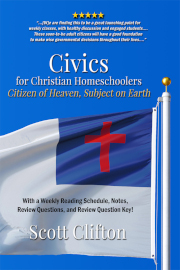Civics for Christian Homeschoolers: Citizen of Heaven, Subject of Earth, a one-semester course for high school students, is presented in a 191-page textbook. The textbook incorporates course author Scott Clifton’s paraphrased version of Frederic Bastiat’s The Law (based on Patrick James Stirling’s translation from the original that was written in French) and uses wording more familiar to today’s students. Bastiat was a French economist and statesman, and The Law was originally published as a pamphlet in 1850. It's available in the public domain, but since the limited-government principles it teaches remain applicable throughout time, it continues to be published as a printed book (available through Amazon and other sources).
Advancing the idea of the limited role of government is part of this course, but it also teaches a biblical view of citizenship while explaining the proper role of government.
Students often read lengthy excerpts from The Law on the first day of the week, followed by lessons related to topics raised by that excerpt. Some topics are covered in one week while others take longer. Clifton divides The Law into manageable chunks, providing his own titles for each section. For example, on page 65 students read the section Clifton titles “The Law: Perfect Rulers, Helpless People?” Clifton’s two lessons that follow this reading are titled “What is a Republic, and How is It Better?” and “Socialism and Communism: The Absolute Pits.” The excerpt from The Law presents the idea that governments tend to treat people as helpless without government assistance and guidance, which justifies government control. Following up, Clifton contrasts republics and democracies and their forms of citizen participation. In the next lesson, Clifton explores socialism and communism, explaining why they cannot work well, largely because people have limited control over their lives. In this way, Clifton’s lessons take students into a deeper study of concepts presented in The Law by looking at both historical and present-day applications.
Four days per week, students are assigned reading in the textbook that concludes with “Let’s Review” and “For Additional Thought” questions. (A free answer key is available at the URL found on page 7 of the textbook.) Typically, but not always, the fourth day adds “Take Action!” activities, such as the two on page 11. One has students take a practice U.S. citizenship test online, and the other has them identify the congressperson for their district and their two state senators and begin praying for them. The fifth day can be used for discussion (in a group class or with parents) or as a day for parents to check student work. While discussion isn’t required, it will almost certainly enhance the course. Students can enroll in Clifton’s online class at additional cost, which provides them with a once-a-week group discussion, quizzes, and tests. Quizzes and tests are only available to students in Clifton’s online or in-person classes, but the questions and activities should give parents sufficient student work to evaluate their understanding.
The course advances the principles of limited government in what might be considered a partisan manner. For instance, in the section defending the idea of jury nullification, Clifton writes,
But jurors should be wary of judges and prosecutors who dogmatically insist that an accused person is guilty—just like anyone should be wary of believing anything government agents tell us, without examining the evidence carefully. This includes, for example, believing various government officials who regularly tell us whoppers like these…
The list of “whoppers” that follows includes one about homeschoolers not learning proper socialization; one about government insistence on masking and shutting down businesses, churches, and social gatherings to stop a virus; government “encouragement” that citizens get an unresearched and untested shot (with the assurance that it’s perfectly safe); and political influencers stoking fears about climate change to justify increased government spending. Clifton’s editorializing develops and supports the ideas presented by Bastiat, but parents must understand the viewpoint underlying the course upfront. The book's tone is provocative, interesting, and laced with humor, so students are likely to enjoy it.
Near the end of the textbook are a copy of the Declaration of Independence and a one-page article by Clifton titled, “What Kingdom Are You a Part Of?” that challenges students to accept Jesus into their lives.
Parents not already familiar with the ideas taught in Civics for Christian Homeschoolers might benefit greatly from reading along with students and discussing the ideas together.
You might consider using Civics for Christian Homeschoolers one semester and Economics for Christian Homeschoolers the other semester since both reflect the same worldview and political outlook. Clifton recommends that students also take his year-long American Government for Christian Homeschoolers course for a greater understanding of the subject.
Summary
Civics for Christian Homeschoolers is not your typical government course, and it’s definitely not approved for use by government-supported schools. But those might be the reasons some Christian homeschooling families choose to use it.










